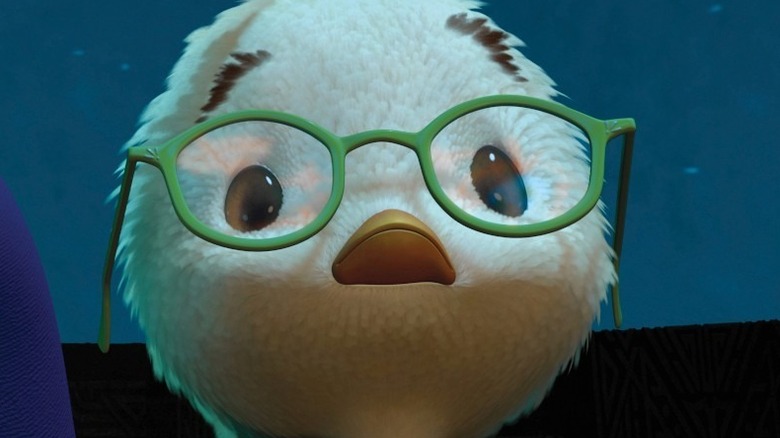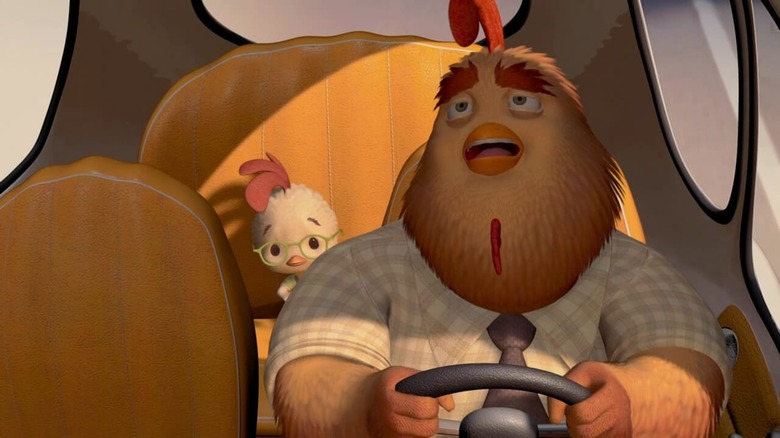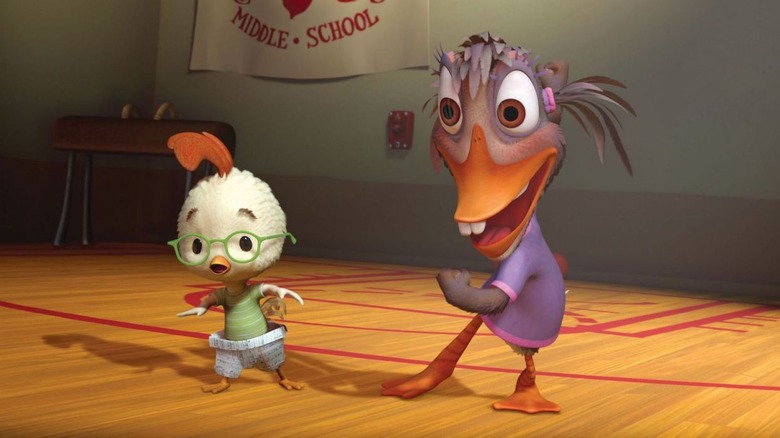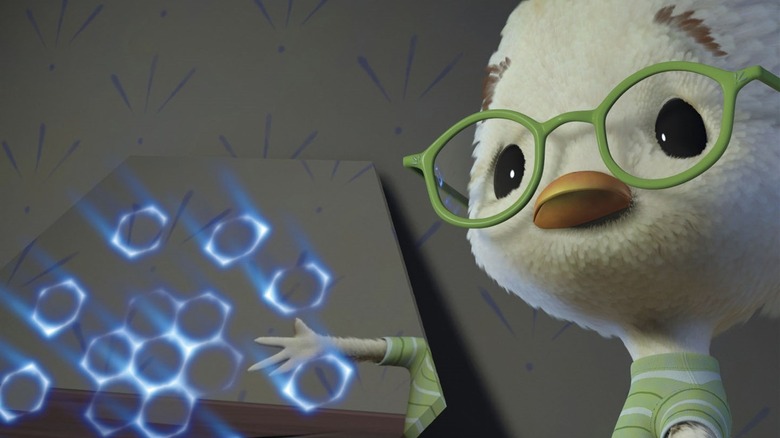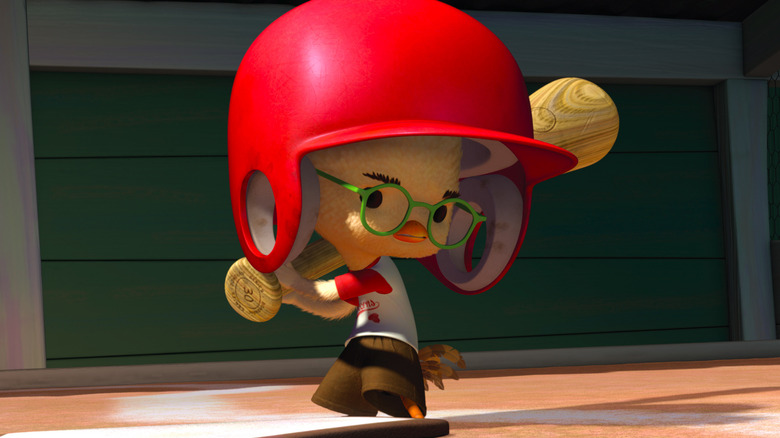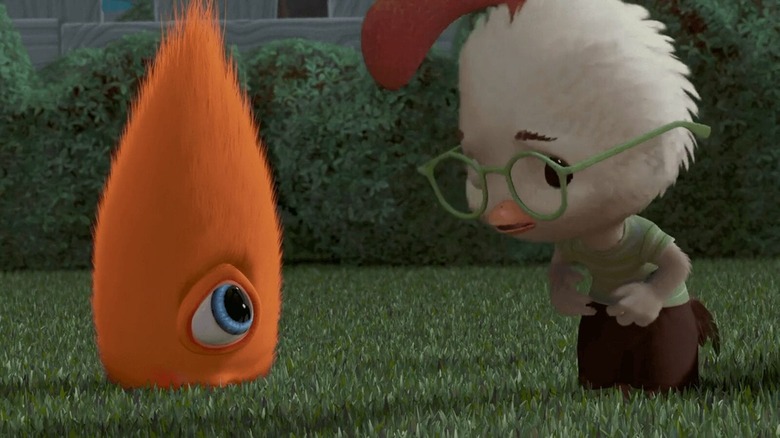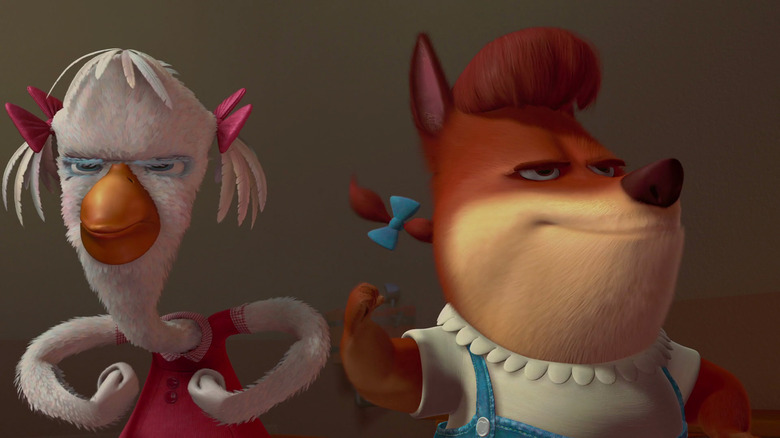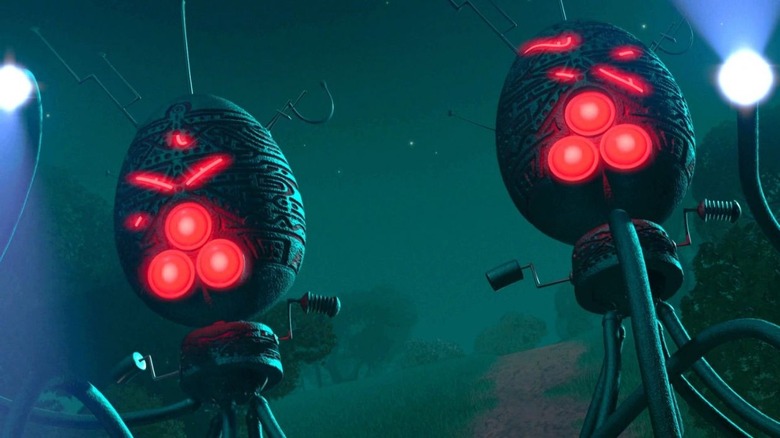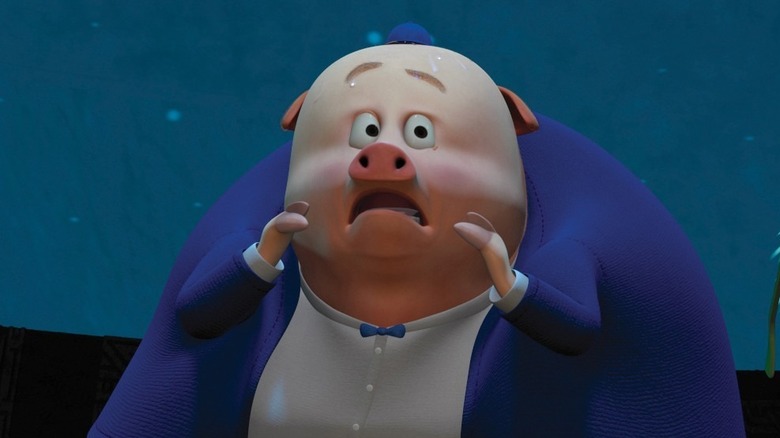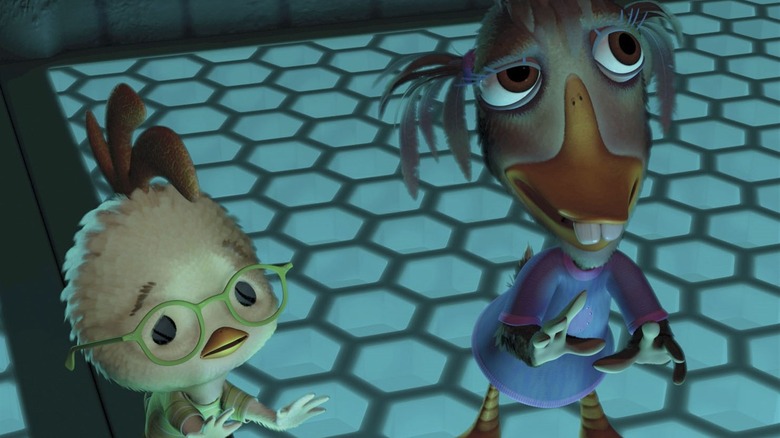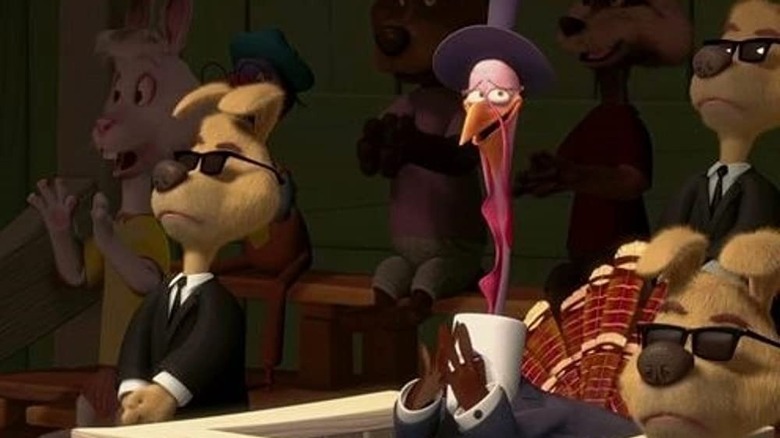Things Only Adults Notice In Chicken Little
Although public opinion around animated Disney movies often deems them entertainment for children, it's nearly impossible to attend a screening without seeing an audience full of adults. Between parents, fans of animation, and even the infamous "Disney adults," people of all ages can enjoy the magic of a big-screen Disney release — and the teams behind these multi-million dollar projects know it, too. That's why many of Disney's animated features, including the controversial "Chicken Little," seem to have jokes and references for their older audiences. From joking about politics to references to straight-up adult content, it's evident that the writers behind some of Disney's most beloved projects seem to include special jokes that'll definitely go over a younger audience's head.
Like so many other Disney films, "Chicken Little" is based on European folklore, but instead of a classic barnyard tale, the film takes on much higher stakes — the complete annihilation of Earth by aliens. After proclaiming that the sky is falling and throwing his town of Oakey Oats into mass hysteria, Chicken Little (Zach Braff) sets out to redeem his image. After a year of ridicule and torment from everyone around him, the down-on-his-luck chicken is the only one that can save everyone from extermination when aliens invade the town. Although the premise might sound like a classic, family-friendly romp for all ages, there are certain aspects to the story that only adults will notice, and we've compiled a list of them.
The change in animation style
With the rise in computer-generated animation from other production companies like Dreamworks and Pixar, Disney first dipped its white-gloved hand into fully computer-generated animation with the 2005 release of "Chicken Little." Although the company had dabbled in CGI with 2000's "Dinosaur," a project that combined live-action with animated dinosaurs, it would be five years before the studio would begin its new animation era. This was a big deal for animation fans, young and old.
Prior to the release of "Chicken Little," Disney relied solely on traditional animation, which is when each frame is completely hand drawn. This obviously took a significantly longer time to produce and required more work from animators, which eventually led to an animator strike in 1941. CGI introduced a more efficient model for the company to create films and other projects, which is why the success of "Chicken Little" was so important. Aside from previously underperforming with its last few releases, "Chicken Little" had to do well to keep up with Disney's competitors who were releasing hits like "The Incredibles" or "Shrek" — both of which were CGI. Unfortunately, Disney just couldn't hit a home run with their plucky chicken adventure. Although "Chicken Little" tied with "Lion King" for one of the largest opening weekends for an animated film, it faced immediate backlash and negative criticism. While most critics applauded its impressive visuals, they mocked its weak storyline. It even won the worst animated picture award at the 2006 Stinkers Bad Movie Awards.
Making fun of other animated fairy tales
Disney built a name for itself with its animated fairy tale adaptations, but a lot had changed between "Snow White and the Seven Dwarves" and "Chicken Little," which came out 58 years later — chiefly, the amount of satire and sarcasm that writers would use in their scripts. Disney's movies that were released in the post-renaissance era –- between 2000 and 2009 –- were a time of experimentation with animation and storytelling. Humor was approached in a more nuanced, sarcastic way. "Chicken Little" was no exception to this transition, and the jabs came almost immediately.
The introduction to any film is important for developing exposition and characters, and animated movies have a number of introduction scene tropes. Instead of using one of Disney's classic techniques, "Chicken Little" opens with a joke that makes fun of these intro cliches. At first, the narrator (Garry Marshall) begins the story with the classic "once upon a time" line, but the same narrator -– with a thicker, New York accent –- interrupts the intro by asking the audience, "How many times have you heard that one?" Marshall, claiming to know a good way to start a movie, begins playing the intro scene to "The Lion King," including its instantly recognizable song. Again, Marshall deems this introduction not good enough for the esteemed "Chicken Little." The scene starts over a third time, panning over the classic storybook trope –- often found in many of Disney's princess stories. Immediately, our narrator dismisses the storybook, saying, "Oh, no. No, not the book. How many have seen opening the book before? Close the book. We're not doing that." Instead, the film finally just begins in the middle of the first instance of Chicken Little-related mass hysteria.
Classic movie references
Many families find themselves introducing classic cinema to their kids early in their lives. While they're probably not holding film school-level seminars with their toddlers on the importance of "Citizen Kane," many parents will find themselves sharing the fundamental films of the last century. Certain kids might understand these older references because of how often they're brought up in modern media, but that certainly doesn't mean the writers had them in mind when crafting these jokes.
While Abby Mallard (Joan Cusack) discusses the intricacies of open communication, the audience is treated to a 1933 "King Kong" reference. For a seasoned movie vet, the scene is instantly recognizable, showing King Kong swatting away planes while on top of the Empire State Building -– except instead of the 50-foot gorilla, it's Fish-Out-of-Water (Dan Molina). Having built a model papier-mâché skyscraper out of discarded magazine articles explaining the correlation between getting closure and molting, Fish swats away paper planes before falling to his theatrical, fake death. Runt-of-the-Litter (Steve Zahn) holds him and tenderly whispers, "'Twas beauty that killed the beast" — a direct quote from the movie.
Adult entertainment references
No matter how smart or internet-savvy they might seem, there are just some jokes that kids aren't going to understand. In fact, we wonder how some of these references even managed to make it past the drawing board, let alone make their way into the final product. Jokes about sexual content and infamous adult entertainment companies are certainly for the adults in the audience, and this next reference is nearly undeniable.
After the town's angry mob fails to catch the spaceship before it disappears, Chicken Little is stuck standing alone in front of a news camera. In an unexpected twist, the cameraman says, "Man, there's no story here," and his partner replies, "At least we can sell the video to 'Chickens Gone Wild'" — referencing "Girls Gone Wild," an adult entertainment franchise that ran from 1997 to 2013. The company showcases amateur videos of young women posing topless during spring break and was huge in pop culture during the early 2000s. Despite its lucrative "Chicken Little" shout-out, it was later revealed that the production was incredibly predatory and the company came under legal fire before filing for bankruptcy in 2013. Regardless of it's bad reputation being revealed much later, the choice to include the joke at all has us scratching our heads.
Making fun of Disney's controversies
Although Disney might be one of the leading production companies spanning the globe, it's had its share of controversies. Many of these are acknowledged, like the racist depiction in "Song of the South," but sometimes others are forgotten. That's why the writer's decision to mock its own controversies is such a surprising choice. The film glimpses over a news broadcast after the second instance of mass hysteria caused by Chicken Little. The broadcaster remarks that chaos is spreading over the town, which causes an "entire family of lemmings to run in fear. But, unable to find a cliff, they instead began throwing themselves from the nearest park bench." This joke directly references the myth that lemmings will leap into the ocean during migration.
The wildest part about this reference is that was directly responsible for Disney perpetuating the same exact myth. Following the release of "White Wilderness," a Walt Disney-produced documentary from 1958, the company received a wave of controversy when it was revealed to be fake. According to one of the cameramen from the production, the lemmings were physically disoriented by crew members and eventually thrown into the ocean by the team.
Parodying other movie franchises
It's safe to say that the parents of 2005 — largely Gen Xers and millennials who grew up in the '70s and '80s – are all too familiar with cultural phenomenons like the Star Wars or Indiana Jones franchises. Of course, we can't assume that younger audiences wouldn't be able to spot a "Star Wars" joke or reference, especially as the franchise continues to get bigger — "Star Wars: Episode III – Revenge of the Sith" came out just two months earlier than "Chicken Little."
The movie picks up right in the middle of the "sky is falling" incident that humiliated Chicken Little and his father. But the townspeople of Oakey Oats didn't just panic, they were sent into a full hysterical episode that resulted in mass property destruction and — assumed — injury. The worst part is the collapse of the Oakey Oat's water tower, which sends a building-sized ball rolling through the center of town. Eventually, the camera cuts to the inside of the movie theater, which is screening "Indiana Jones: Raiders of the Lost Ark," which features its own boulder scene. As the boulder rolls towards Indiana Jones, the water tower ball crashes through the movie screen.
Of course, the writers had to throw in a little "Star Wars" joke. While trying to communicate with Kirby, the alien child whose disappearance prompts the entire alien invasion, the gang realizes that they aren't able to understand him. Luckily, Fish-Out-of-Water manages to decipher the otherworldly language. During the multi-person exchange, Runt apparently gets so disoriented that he blurts out, "Darth Vader is Luke's father?"
Horror movie references
Generally, there's not a lot of overlap between the horror genre and children's media. Aside from popular, family-friendly scares found in the "Goosebumps" series or "Are You Afraid of the Dark," there isn't usually a place for graphic or disturbing visuals and storylines. Still, that doesn't mean references to iconic horror movies are off the table for children's media — many of which a young audience won't understand.
"Chicken Little," a movie that revolves around an alien invasion, has a couple of horror movie references along with its other classic movie references. The first introduction to the alien characters draws an immediate comparison to "War of the Worlds," which premiered three months prior. Just like in Steven Spielberg's adaptation of H.G. Wells' seminal sci-fi story, the aliens in "Chicken Little" use tall, metal, dome-shaped contraptions to move around and interact on Earth. While they aren't as tall, the general shape is almost identical to the 2005 film. Similarly, Abby Mallard says the line, "It's like 'War of the Worlds' out there" during the invasion. "War of the Worlds" has a PG-13 rating, which means some older kids might be familiar with these references. But the writers didn't stop there, they also indirectly reference "Alien" — which has an R-rating — after the kids initially discover the spaceship. While experiencing a panic episode, Runt describes Fish-Out-of-Water's demise after being abducted. He guesses that their friend is now acting as a "host for their face-hugging embryo babies," directly referencing the facehugger parasites from the film.
Gay stereotypes
Comedy might be subjective, but it's probably safe to say that the early 2000s weren't the strongest time for comedic writing. While there were a number of successful, well-written comedies throughout the era, it was also the same decade that saw "Epic Movie," "Master of Disguise," and other critical flops. Early comedy often touched on a sensitive subject matter — often referring to it as dark humor — that targeted certain vulnerable communities, including the LGBTQ+ community. While some writers still create characters around insensitive, surface-level tropes, modern writers typically find ways to flesh out these characters beyond stereotypes. But when it comes Runt-of-the-Litter, a comically-oversized piglet, Disney couldn't seem to write beyond the "gay best friend" trope.
Runt was written like a stereotypical, effeminate character. While the character never explicitly discusses his sexuality or any romantic interests, his characteristics align with the other gay best friend stereotypes of the era. Along with being high-strung, agoraphobic, and highly emotional, these characters are usually reduced to comedic bits — which means they aren't necessarily treated like people. Runt is best known in the film for his rendition of "Wannabe" by the Spice Girls and his chronic panic attacks under pressure. He doesn't really contribute anything to the friend group or help to save the town — in fact, he usually makes situations very difficult for his friends. Runt does manage to save Chicken Little and his father from the aliens towards the end of the movie, but he can only act brave while completely blacked out to the vocal power of Gloria Gaynor.
Literary puns
It might not be fair to assume that younger audiences won't understand a joke based on a pun, but it's far more likely that it'll go unappreciated. Since the very beginning of Disney's work in animation, the company has been improving its backgrounds and background gags. That's why so many fans find themselves noticing different details with each rewatch of more modern films. Puns, idioms, and satire are all techniques that Disney's writers have used in almost all of its movies. There are various background gags throughout "Chicken Little" ranging from visual puns to witty takes on common idioms.
Following the title sequence that follows Chicken Little running to school, the audience might be able to catch a glimpse of a "bull in a china shop." But, unlike the idiom suggests, the anthropomorphic bull actually works in the china shop, instead of causing destruction. Similarly, while lecturing Chicken Little over the importance of closure, Abby Mallard is shown riffling through various takes on the duck version of popular magazines. She scours through copies of "Cosmo Duck" and "Modern Mallard" in search of articles on the effects of open communication and molting. Some of the background gags aren't visual gags at all but are told through dialogue — which may be even more difficult for younger audiences to understand. When Chicken Little is about to reach the home plate during his baseball game, the announcer says "Hold your horses, and horses, hold your breath."
Political jokes
Puns and classic film references might not be a big stretch for knowledgeable younger audiences, but that doesn't mean any topic is fair game. If there's one thing that many kids won't understand, it's politics. Sure, some stories might explore the very basic understanding of evil politicians, but politics isn't something that family-friendly movies really touch on. Characters in the D.C. Universe might have political allies and the assistant mayor in "Zootopia" might be plotting an evil, socially dividing scheme, but rarely are these political figures the butt of any jokes.
Unlike the important figureheads found in other children's media, the mayor in "Chicken Little" is incompetent. Not only is Mayor Turkey Lurkey (Don Knotts) unable to lead, but he's pretty much unable to even have his own thoughts. One of the running gags throughout the film shows the mayor's secret service flashing his cue cards to guide him through his actions. From clapping to weeping hopelessly, the mayor simply can't make his own decisions. Additionally, he can't seem to focus, even in critical, life-threatening moments. When Chicken Little is leading the town to the alien's spaceship, it's the mayor the stops all of the townspeople in their tracks to pick up a penny. This distraction is what causes the mob to miss the spaceship entirely, and once again embarrass Chicken Little and his father. We wonder how he ever managed to get elected.
